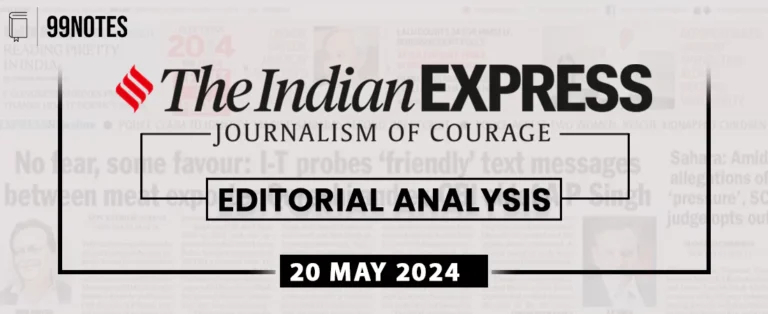10 June 2025 : Daily Current Affairs
1. Govt., Kuki-Zo groups discuss SoO rules; will meet again next week
Source: The Hindu, Page 1 & 10, June 10, 2025
| Topic: GS Paper 3 – Internal Security; GS Paper 2 – Governance |
| Context |
|
Content:
-
The meeting aimed to address ethnic tensions between Kuki-Zo and Meitei communities post-2023 violence.
-
Key discussion points:
-
Violations of SoO ground rules.
-
Need to shift camps from Meitei-dominated areas.
-
Reopening National Highways 2 and 37 for free movement.
-
-
SoO agreement, in force since 2008, is being reviewed for a long-term peace roadmap.
-
Essential for restoring connectivity and governance in the violence-affected region.
Analysis:
-
Highlights ethnic fault lines in Manipur and challenges in federal conflict resolution.
-
Balancing tribal autonomy demands with territorial integrity is crucial.
-
Signifies the centre’s reliance on negotiated peace rather than force.
Practice Question:
|
“Discuss the significance of the Suspension of Operations (SoO) agreements in managing ethnic conflicts in Northeast India. What are the challenges in ensuring their effective implementation?” (250 words / 15 marks) |
2. India’s first e-waste recycling park to be built in Delhi: Sirsa
Source: Page 2, The Hindu, June 10, 2025
| Topic: GS Paper 3 – Environment (Waste Management); GS Paper 2 – Governance (Urban Planning) |
| Context |
|
Content:
-
Will be built over 11.4 acres under a PPP (DBFOT) model.
-
Capacity: 51,000 tonnes of e-waste annually.
-
Will process all 106 categories under the E-Waste Management Rules, 2022.
-
Expected to generate ₹350 crore revenue and 1,000 green jobs.
-
Features:
-
Zones for dismantling, refurbishing, plastic recovery.
-
Training centres to formalise informal sector workers.
-
Analysis:
-
Aligns with Sustainable Development Goals (SDGs) – especially SDG 12 (Responsible Consumption and Production).
-
Shows state-level innovation in tackling e-waste, India being one of the largest e-waste generators.
-
Formalising informal sector addresses labour rights and occupational hazards.
Practice Question:
|
Evaluate the role of urban eco parks in managing electronic waste and promoting circular economy in Indian cities. (250 words / 15 marks) |
3. A new water harvesting model promises to help Rajasthan’s farmers
Source: The Hindu, Page 4, June 10, 2025
| Topic: GS Paper 1 – Geography (Water Resources); GS Paper 3 – Agriculture, Environment |
| Context |
|
Content:
-
50 ponds constructed; 25 more planned.
-
Each 10-foot-deep, plastic-lined pond is built on 5% of farmer’s land.
-
Targets 10 crore litre monsoon runoff conservation.
-
Enables cultivation of rabi and kharif crops in water-scarce regions.
-
Promotes groundwater recharge, livestock, and agri-value chains.
Analysis:
-
A climate-resilient model for semi-arid areas.
-
Decentralised and community-driven solution to irrigation needs.
-
Can be scaled under Jal Shakti Abhiyan and MGNREGA.
Practice Question:
| “Examine the significance of decentralized rainwater harvesting models like farm ponds in achieving sustainable agriculture in arid and semi-arid regions of India.” (150 words / 10 marks) |
1. India’s first e-waste recycling park to be built in Delhi: Sirsa
Source: Page 2, The Hindu
| Topic: GS Paper 3: Environment (Waste Management), GS Paper 2: Governance (Urban Planning & PPP models) |
| Context |
|
Analysis of the news:
-
Project Features:
-
Location: Holambi Kalan, North Delhi
-
Area: 11.4 acres
-
Mode: DBFOT (Design, Build, Finance, Operate, Transfer) under Public-Private Partnership
-
Capacity: 51,000 tonnes/year
-
Concession period: 15 years
-
-
Benefits:
-
Expected revenue: ₹350 crore
-
Creation of over 1,000 ‘green jobs’
-
Integration of informal sector workers into formal waste management
-
Skilling and training facilities to upskill e-waste handlers
-
Dedicated zones for:
-
Dismantling
-
Refurbishing
-
Plastic recovery
-
Second-hand electronics market
-
-
-
Significance:
-
Promotes circular economy principles
-
Aligns with E-Waste Management Rules, 2022
-
Helps reduce environmental hazards from unregulated e-waste recycling
-
2. Govt., Kuki-Zo groups discuss SoO rules; will meet again next week
Source: Page 10, The Hindu
| Topic: GS Paper 3: Internal Security; GS Paper 2: Governance (Peace-building Mechanisms) |
| Context |
|
Analysis of the news:
-
Background:
-
SoO agreement operational since 2008
-
Talks suspended post-May 2023 ethnic violence in Manipur
-
-
Key Discussion Points:
-
Opening of NH-2 and NH-37 for free vehicle movement
-
Closure/relocation of Kuki-Zo camps near Meitei areas
-
Surrender of weapons by insurgents
-
Long-term roadmap for peace and normalcy
-
-
Security Implications:
-
Enhances critical supply chains in Manipur
-
Addresses ethnic conflict between Kuki-Zo and Meitei communities
-
-
Challenges:
-
Distrust among ethnic groups
-
Slow progress in ground rule enforcement
-
3. A new water harvesting model promises to help Rajasthan’s farmers
Source: Page 4, The Hindu
| Topic: GS Paper 1: Geography (Water Resources); GS Paper 3: Agriculture, Environment (Sustainable Farming Practices) |
| Context |
|
Analysis of the news:
-
Implementation:
-
50 ponds completed, 25 more underway
-
Constructed on 5% of each farmer’s land
-
Each pond: 10 feet deep with plastic lining
-
-
Impact:
-
Targets 10 crore litre monsoon runoff conservation
-
Reduces dependence on overexploited groundwater (Jaipur draws 2.22x recharge)
-
Supports both kharif and rabi cropping
-
Revives livestock rearing and horticulture
-
-
Developer:
-
Vipra Goyal (IIT Kharagpur alumnus), previously worked with NITI Aayog
-
-
Scalability & Benefits:
-
Recharges groundwater
-
Provides year-round irrigation
-
Potential for agro-based industries, dairy, and food processing
-
Check more: 09 June 2025 : Daily Current Affairs




